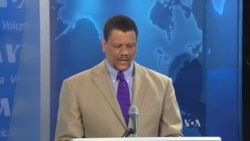It’s been 20 years since genocide claimed the lives of at least 800,000 Rwandans. As part of the commemoration of the event, VOA this week hosted a panel discussion - focusing on longstanding criticism that international news media underreported the 1994 massacres.
Rwanda was in the midst of a civil war in 1994 and extremist media were encouraging ethnic hatred against minority Tutsis in the run-up to the genocide. At the same time, Allan Thompson of Carleton University in Canada said Rwanda was a low priority for international media even after the massacres began on April 7.
"I think international media, by its virtual absence did contribute to those events," said Thompson.
Thompson’s pointed "Not until several weeks into the genocide did international media really begin reporting on the killings carried out by extremist majority ethnic Hutus."
Thompson, a former foreign correspondent, was speaking at a panel on Media and Genocide Prevention this week at VOA headquarters in Washington. Also among the panelists was Michael Dobbs of the U.S. Holocaust Museum, who said the conflict in Bosnia-Herzegovina partly explains the media’s relative lack of interest in Rwanda at the time.
"The second big event at that time was the inauguration of Nelson Mandela as President of South Africa so all the African reporters who probably would have gone immediately to Rwanda as soon as the killings began on April 6 and 7, they were all focused on this big event in South Africa," said Thompson.
Mark Nelson of the Center for International Media Assistance said reporting on the genocide was just very daunting even for seasoned and competent international reporters.
"It was really difficult for everybody to figure out what to do about it. The Wall Street Journal at the time didn’t have anybody in Africa except in South Africa. And it just did not seem like something we could to anything about," he said.
So, what have journalists and media learned from the Rwandan Genocide. Are media now better able to recognize possible warning signs of impending atrocities?
Idriss Fall of VOA’s French-to-Africa Service saw similarities between the work of extremist media in Rwanda in 1994 - and some newspapers in the Central African Republic today.
"They don’t have a power radio like Mille Collines (former Rwandan radio station). But they have small newspapers, this size, and most of them are doing a kind of insidious propaganda. Everything is there," he said.
The widespread persecution of the Central African Republic’s Muslim minority has created what the United Nations has called a pre-genocide situation . In 1994, The Rwandan genocide claimed the lives of at least 800,000 Tutsis and moderate Hutus in the space of just three months.
Rwanda was in the midst of a civil war in 1994 and extremist media were encouraging ethnic hatred against minority Tutsis in the run-up to the genocide. At the same time, Allan Thompson of Carleton University in Canada said Rwanda was a low priority for international media even after the massacres began on April 7.
"I think international media, by its virtual absence did contribute to those events," said Thompson.
Thompson’s pointed "Not until several weeks into the genocide did international media really begin reporting on the killings carried out by extremist majority ethnic Hutus."
Thompson, a former foreign correspondent, was speaking at a panel on Media and Genocide Prevention this week at VOA headquarters in Washington. Also among the panelists was Michael Dobbs of the U.S. Holocaust Museum, who said the conflict in Bosnia-Herzegovina partly explains the media’s relative lack of interest in Rwanda at the time.
"The second big event at that time was the inauguration of Nelson Mandela as President of South Africa so all the African reporters who probably would have gone immediately to Rwanda as soon as the killings began on April 6 and 7, they were all focused on this big event in South Africa," said Thompson.
Mark Nelson of the Center for International Media Assistance said reporting on the genocide was just very daunting even for seasoned and competent international reporters.
"It was really difficult for everybody to figure out what to do about it. The Wall Street Journal at the time didn’t have anybody in Africa except in South Africa. And it just did not seem like something we could to anything about," he said.
So, what have journalists and media learned from the Rwandan Genocide. Are media now better able to recognize possible warning signs of impending atrocities?
Idriss Fall of VOA’s French-to-Africa Service saw similarities between the work of extremist media in Rwanda in 1994 - and some newspapers in the Central African Republic today.
"They don’t have a power radio like Mille Collines (former Rwandan radio station). But they have small newspapers, this size, and most of them are doing a kind of insidious propaganda. Everything is there," he said.
The widespread persecution of the Central African Republic’s Muslim minority has created what the United Nations has called a pre-genocide situation . In 1994, The Rwandan genocide claimed the lives of at least 800,000 Tutsis and moderate Hutus in the space of just three months.





